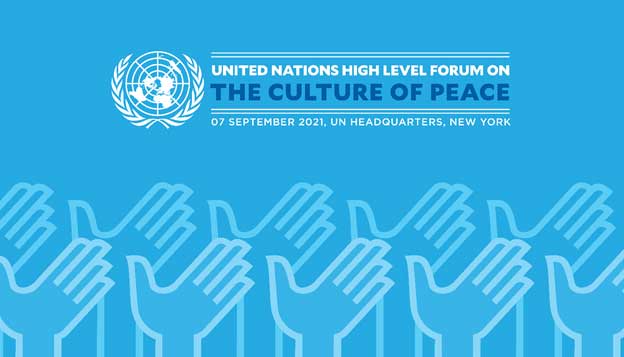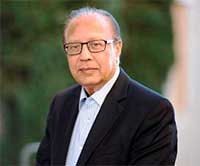A Milestone Anniversary Reiterates The Culture of Peace is a Movement, not a Revolution

Credit: United Nations
NEW YORK, Sep 13 2021 (IPS) - Today, on 13 September 2021, the UN Declaration and Programme of Action adopted by the General Assembly in 1999 will be turning 22.
You would recall that the 20th anniversary of The Culture of Peace of its adoption by the world’s highest multilateral body in 2019 was observed by the United Nations in an appropriate and befitting manner, as called for by the Assembly. It was an occasion for reiteration and recommitment by us all to create the culture of peace in our world, beginning with each one of us.
After the UN Charter, this is the only major document of the UN which focuses on peace in a most comprehensive manner. We need to pay increasingly more attention to this landmark document for its full and effective implementation.
Last week another integrally-connected milestone gathering – the 2021 UN High Level Forum on The Culture of Peace – took place at the UN General Assembly convened by its President of the 75th session.
This day-long event organized on 7 September 2021 attained a special profile and attention as it was the 10th anniversary of the annual UN high level forums which was first initiated in 2012 during the 66th session of the Assembly by its then President, Ambassador Nassir Al-Nasser of Qatar.
His objective was to create a new platform for the culture of peace at the UN to be held on an annual basis for an opportunity to exchange ideas between the Member States and civil society organizations.
I happened to be his senior special advisor involved in conceptualizing and organizing that very first forum on 14 September, the day after the 11th anniversary of The Culture of Peace.

Ambassador Anwarul K Chowdhury
The President of the General Assembly Volkan Bozkir of Turkey, under whose leadership the 2021 Forum took place, earned the grateful tribute of all stakeholders for his guidance, initiative and encouragement in convening and holding this 10th anniversary forum under extremely challenging circumstances very successfully. The Panel Discussion was a fitting conclusion to this remarkable gathering.
As I was preparing for the Panel Discussion, I ran into the historical perspective that this year will reach the quarter century mark of my close association with and advocacy for the culture of peace at the United Nations. In 1997, I took the lead in proposing along with some other Ambassadors in a letter to the newly-elected UN Secretary-General Kofi Annan to include a specific, self-standing agenda item of the UN General Assembly (UNGA) on The Culture of Peace.
A new agenda item was thus agreed upon after considerable negotiating hurdles and the new item was allocated to the plenary of the General Assembly for discussion on an annual basis. That is the basis for the annual resolutions on The Culture of Peace by the General Assembly from that year.
Under this item, UNGA adopted in 1997 a resolution to declare the year 2000 the “International Year for The Culture of Peace”, and in 1998, a resolution to declare the period from 2001 to 2010 as the “International Decade for The Culture of Peace and Nonviolence for the Children of the World”.
In the year after that the United Nations adopted its Declaration and Programme of Action on The Culture of Peace, a monumental document that transcends boundaries, cultures, societies and nations. It was an honor for me to Chair the nine-month long negotiations that led to the adoption of this historic norm-setting document by consensus.
As I mentioned Secretary-General Kofi Annan earlier, let me quote his thoughts on the culture of peace – I cite this quote often: “Over the years we have come to realize that it is not enough to send peacekeeping forces to separate warring parties. It is not enough to engage in peace-building efforts after societies have been ravaged by conflict. It is not enough to conduct preventive diplomacy. All of this is essential work, but we want enduring results. We need, in short, the culture of peace.”
Absolutely right – we need “enduring results” and for that we need “The Culture of Peace”. The Culture of Peace is not a hollow phrase – or an empty sentiment. It has a transformational opportunity for humanity – it has the energy and enthusiasm of many of us individually and collectively around the world.
These annual forums are very special in their involvement of civil society. These are the only High-Level Forums in the UN which are fully 50-50 gender balanced in their panel compositions. I am proud to say that this was possible as the Global Movement for The Culture of Peace (GMCoP) which is the civil society partner in supporting the Forum has been very diligent in upholding these values.
The concept note of this year’s Forum forcefully reiterated that “…it is an imperative to inculcate the values of The Culture of Peace among nations, societies and communities, with particular attention to the younger generation, through promotion of compassion, tolerance, inclusion, global citizenship and empowerment of all people.”
The theme focusing on the transformative role of the culture of peace in relation to Covid recovery provided a platform to explore and discuss multiple ways and means for empowering all segments of the society, towards a resilient recovery, including by ensuring vaccine equity, asserting universal vaccination as a public good, bridging digital divide, ensuring centrality of women’s equality and empowerment, harnessing the power of youth and highlighting education, health and overall wellbeing of children.
Bangladesh Foreign Minister Dr. AK Abdul Momen in his pre-recorded video presentation at the Forum articulated succinctly that “We must recognize that rebuilding from the COVID pandemic necessitates a renewed commitment and partnership of all stakeholders. Our efforts should be undergirded by the values of “The Culture of Peace’ as instilling these values contribute to building a resilient, inclusive and peaceful society.”
This year’s Forum heard the inspirational keynote speech by Dr. Beatrice Fihn, the Executive Director of 2017 Nobel Peace Prize winning organization ICAN, International Coalition for the Abolition of Nuclear Weapons, by calling on all that “On this 10th anniversary of the culture of peace, I am urging you all to continue and strengthen your work to promote education, sustainable and economic developments, human rights, gender equality, democratic participation and international peace and security.
She is the sixth Nobel Peace Prize laureate as the keynote speaker at The Culture of Peace Forums, which also make us proud that all of them are distinguished women Nobel Peace laureates. Complimenting Dr. Fihn for her keynote, I underlined that the essence of her keynote message has now become more pertinent in the midst of the ever-increasing militarism and militarization that is destroying both our planet and our people.
Video message by the activist and globally respected Mayor Kazumi Matsui of Hiroshima, the city which along with Nagasaki bear the scars of nuclear destruction and yearn for global peace, highlighted a major engagement of his world-wide peace organization announcing that “On the 7th of July this year, Mayors for Peace, which I preside over, adopted our new Vision, a set of concrete action guidelines, titled: “Vision for Peaceful Transformation to a Sustainable World.”
One of the objectives set forth by the new Vision is to ‘promote a culture of peace’.” Informing that the foundation of this policy change rests in the ability to build a consensus in favor of the abolition of nuclear weapons, he asserted that “To do this, first cultivating a culture of peace-a culture in which the everyday actions of each person are grounded in thinking about peace-is essential.
It is our belief, that this “bottom-up” approach is the most viable approach to peace, and is in line with the values which prompted the efforts of Ambassador Chowdhury and those in attendance.”
The Mayor’s passionate message included in the Peace Declaration, which he delivered in Hiroshima on 6th of August this year, advocated forcefully that “When like-minded people who seek peace unite for the same purpose, we can bring about a significant change in the world.”
Mayor Matsui encouraged the Forum by informing that “Mayors for Peace consists of over 8,000 member cities in 165 countries and regions around the world. With support from member mayors for our aforementioned cause, we will work to promote a culture of peace by expanding our membership and reaching out to a wider public.”
Often, I am asked how I assess the progress made so far since the Assembly adopted the Programme of Action in 1999. At this year’s High-Level Forum, as the Chair-Moderator of its Panel Discussion, I repeated my concern that lamentably, The Culture of Peace has yet to attain its worth and its due recognition at global and national levels as a universal mandate for the humanity to attain sustainable peace in the true sense.
When people wonder what are my plans to advance the concept in the UN system, my response verges on my advocacy message in general. The Declaration and Programme of Action on Culture of Peace adopted without any reservation is a landmark document of United Nations.
The Organization should, therefore, own it and internalize its implementation throughout the UN system. There seems to be lethargy in that direction because, I believe, the Secretary-General needs to make the culture of peace a part of his leadership agenda.
We should get that attention and engagement from him. Also, the UN entities, at least most of them, are preoccupied with what is known as “active agenda” which is a kind of daily problem-solving or problem-shelving.
That means no opportunities to focus on longer term, farsighted objective of sustainable peace with a workable tool that UN possess in the culture of peace programme adopted by its own apex body, the General Assembly. It is like a person who needs a car to go to work and has a car… but with a minimal interest in knowing how to drive it.
Many treat peace and culture of peace synonymously. There is a subtle difference between peace as generally understood and the culture of peace. Actually, when we speak of peace we expect others namely politicians, diplomats or other practitioners to take the initiative while when we speak of The Culture of Peace, we know that initial action begins with each one of us.
For more than two decades, my focus has been on advancing The Culture of Peace which aims at making peace and non-violence a part of our own self, our own personality – a part of our existence as a human being.
I believe The Culture of Peace is not a quick-fix. It is a movement, not a revolution!
Ambassador Anwarul K. Chowdhury is Founder of The Global Movement of The Culture of Peace (GMCoP); former Under-Secretary-General of the UN and the Chair of the negotiations which resulted in the consensus adoption of the UN Declaration and Programme of Action on The Culture of Peace in 1999. He was the Chair and Moderator of the virtual Panel Discussion at 2021 UN High Level Forum on The Culture of Peace on 7 September 2021.
- ADVERTISEMENTADVERTISEMENT


IPS Daily Report







